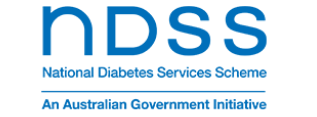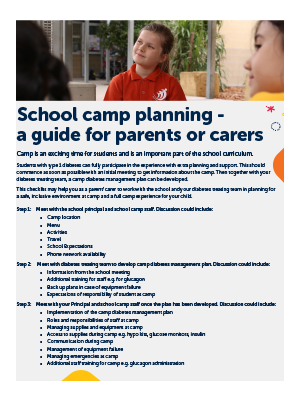The following are guidelines to assist in supporting students with type 1 diabetes, families and schools to get the best out of school camps
Students with type 1 diabetes can participate fully in a camp program with sufficient planning and communication. It is recommended that students who attend camp be reliably independent in the care of their type 1 diabetes.
This may include the ability to:
- inject their own insulin
- check and act on blood glucose levels
- recognise and treat hypoglycaemia
- count carbohydrates
- understand the need for extra food or insulin adjustments before, during and after exercise
- confidently change pump sets and replace continuous monitoring or flash sensors. School staff members attending camp must become familiar with type 1 diabetes and the needs of their students by completing relevant training.
Preparing for camp
Planning checklists
These checklists are to assist parents or carers identify considerations when planning type 1 diabetes management for a child attending a school camp. We encourage parents or carers and school staff to meet and discuss these considerations early in the school year. These checklists may highlight where children and/or staff require training or an update of specific type 1 diabetes management skills.
Camp management plan and action (emergency) plan
With the aid of a camp management plan, families and school staff can develop a coordinated plan to address any situations which may arise on a school camp. These include the impact of camp activities on glucose levels and insulin management, overnight glucose monitoring and meal planning. A copy of the child’s diabetes action plan, which ordinarily accompanies their diabetes management plan for school, should be attached to the camp management plan. The action plan includes a flow chart with instructions for dealing with hypoglycaemia (hypo) and hyperglycaemia (hyper). This is an important document that should be made readily available for all staff for the duration of the camp.
Risk minimisation plan
The school will consider any risks that may arise on camp and discuss with parents or carers plans and actions to manage them if they arise.
Communication plan
There are two key communication points: before the camp and during the camp.
Prior to camp, allocate time to assist the school in preparing and planning for any foreseeable events that require decisions and actions around the child’s type 1 diabetes management.
During the camp, clearly outline timing, methods and the type of communication that will be used. This will ensure school staff keep parents informed if requested but also in which circumstances parents/carers can expect to be contacted to give support to school staff. This communication will also outline and give consent in the situation where a student with type 1 diabetes may require external medical attention.




